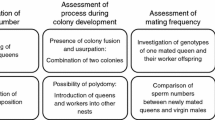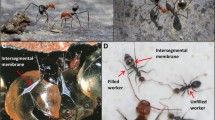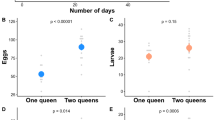Summary:
In the ponerine ant, Pachycondyla villosa, 40% of all collected founding colonies were pleometrotic associations with two (24%) or three (16%) queens. The egg-laying rate of solitary founding queens did not differ from that of queens in the two-queen groups, whereas individual queens in the three-queen groups laid significantly fewer eggs. Twenty-one weeks after collection pleometrotic associations contained significantly more workers than nests founded by haplometrosis. During the founding phase only one queen per founding association left the nest to forage. Within pleometrotic founding groups the number of eggs laid by individual queens did not differ, and no aggressive behavior occurred, even in the presence of workers. P. villosa seems to be one of the rare cases, where pleometrosis can lead to primary polygyny at least in the laboratory, with the queens coexisting in mature colonies without antagonistic behavior.
Similar content being viewed by others
Author information
Authors and Affiliations
Additional information
Received 30 July 1997; revised 14 January 1998; accepted 27 January 1998.
Rights and permissions
About this article
Cite this article
Trunzer, B., Heinze, J. & Hölldobler, B. Cooperative colony founding and experimental primary polygyny in the ponerine ant Pachycondyla villosa. Insectes soc. 45, 267–276 (1998). https://doi.org/10.1007/s000400050087
Issue Date:
DOI: https://doi.org/10.1007/s000400050087




